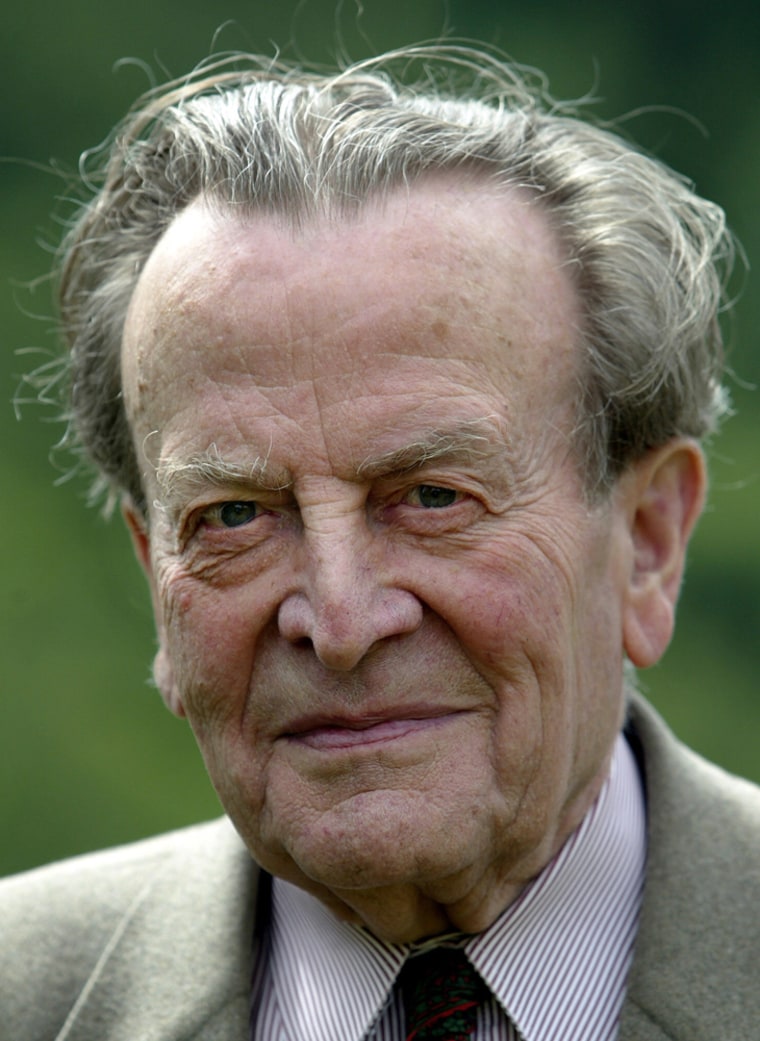Philipp Freiherr von Boeselager, believed to be the last surviving member of the inner circle of plotters who attempted to kill Adolf Hitler in 1944 with a briefcase bomb, has died. He was 90.
The German military said in a statement Friday that the former army major died Thursday night. It did not give a cause of death.
Von Boeselager was part of a group of officers who tried to kill Hitler on July 20, 1944, supplying explosives for the operation led by Col. Claus Graf Schenk von Stauffenberg.
The von Stauffenberg plot is the basis for the upcoming Tom Cruise film "Valkyrie" in which the American actor plays the aristocratic colonel.
Von Stauffenberg placed the bomb in a conference room where Hitler was meeting with his aides and military advisers but escaped the blast when someone moved the briefcase next to a table leg, deflecting much of the explosive force.
Almost immediately afterward, von Stauffenberg and many of his cohorts were arrested and executed in an orgy of revenge killings that saw some hanged by the neck with piano wire. Though many of those rounded up by Nazi officials were tortured in the hopes they would give up other conspirators, von Boeselager's name was never divulged and he was never found out.
Still, he carried a cyanide capsule with him until the end of the war in case his secret was revealed.
'Stopping the crimes'
Von Boeselager, who lived in Altenahr, near Bonn, was first recruited by von Stauffenberg coconspirator Maj. Gen. Henning von Tresckow in 1942, he told the Frankfurter Allgemeine Zeitung in an interview three weeks ago that was published Friday.
He said he knew that Jews were being systematically killed and that Germany was waging a war of annihilation along the Eastern Front with Russia and that he never considered declining taking part in the plot.
By 1942, he said that "It was no longer about saving the country, but about stopping the crimes," the newspaper quoted him as saying.
Assigned to the army high command as an aide to Field Marshal Gunther von Kluge, the plotters first arranged for von Boeselager to try and shoot both Hitler and SS-chief Heinrich Himmler at a meeting in 1943.
Von Kluge, who committed suicide a month after the 1944 attempt on Hitler, called the assassination off at the last minute after learning that Himmler would not be at the meeting.
Von Boeselager followed von Kluge's orders, but told the FAZ the decision to do so never ceased to haunt him.
"I always see Hitler from here to the fireplace in front of me and think 'What would have happened if you had shot him?'" he told FAZ, describing a distance of about two feet with his hands.
He also recalled when he joined the von Stauffenberg plot: his brother called him in the spring of 1944, asking for his help in providing explosives.
'It was not believable'
Von Boeselager recommended English-made explosives as the best, and — as part of his assignment to an explosives research team — was able to acquire them without drawing suspicion.
He delivered them to Maj. Gen. Helmuth Stieff, packed into a suitcase. Stieff was later executed for his role in the plot, and von Boeselager's brother was killed in fighting on the Eastern Front.
Had the bombing succeeded, von Boeselager said he was assigned to lead a 1,000-man unit into Berlin to secure the capital.
Von Boeselager told FAZ that in the years immediately after the war, he spoke with his wife, Rosa, about his role in the resistance, but otherwise said little else.
"There was nobody one could talk with about it," he said. "They were all dead, and with others it would just have been bragging."
There was also the fact that immediately after World War II, the July 20 plotters were widely viewed as traitors, a label the Nazis gave them that stuck for years.
"For a long time, it was not believable to normal Germans that the government was criminal," he recalled. "And as soon as one thought they had pushed that out of the way, then people just didn't want to know."
